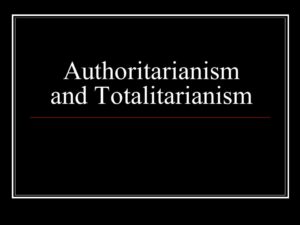What is Authoritarianism in Government

There are different forms of government we have, and Authoritarianism is one of them. This brings us to ask the question, ‘What is Authoritarianism’. In this blog post, we will explain what Authoritarianism is and every aspect of it you should know. Keep reading to find out!
What is Authoritarianism?
Authoritarianism is a political ideology that emphasizes obedience to leaders and strict discipline. It is typically found in totalitarian regimes, where the government controls everything and citizens are forced to follow rules. Authoritarianism is also present in some democratic countries, where the government controls certain aspects of people’s lives but allows freedom of speech and assembly.
Types of Authoritarianism
There are a few different types of authoritarianism in government.
One is totalitarianism, which is when the government has total control over everything and its citizens. This is the type of government that North Korea and Nazi Germany were both under.
The second type of authoritarianism is paternalism. This is when the government assumes that it knows what’s best for its citizens and tries to control their every move. China is a good example of this kind of government, because they try to control the way their citizens live their lives through laws and regulations.
The third type of authoritarianism is diffused or limited authoritarianism. This is when the government doesn’t have total control over its citizens, but it does have some power over them. For example, Russia has this kind of government, because they don’t have a dictatorship like North Korea or Nazi Germany, but they do have some restrictions on freedom.
The Effects of Authoritarianism on Society
Authoritarianism in government is defined as a form of government in which the ruling party has control over all aspects of society. Authoritarianism leads to a number of negative effects on society, including increased intolerance, increased restrictions on freedom, and increased inequality.
The effects of authoritarianism on society are clear and significant. Authoritarian regimes discourage critical thinking and free speech, leading to a decline in the quality of public life. They also create a culture of fear, leading to a decline in social and political stability. In short, authoritarian regimes have a negative impact on the quality of life for their citizens.
Despite these serious consequences, many people support authoritarian regimes because they believe that they are necessary for stability. However, this is not always the case. In fact, authoritarian regimes often lead to increased instability and conflict.
Ultimately, the effects of authoritarianism on society are clear and significant. Anyone who cares about the wellbeing of their fellow citizens should be opposed to authoritarianism in government.
You may also like;
- Titanic Wreck Location – Where the Famous Shipwreck happened
- What is Intersectional Feminism?
- When did Apartheid end?
- How did Catherine the Great die?
- How long did the attack on pearl harbor last?
Frequently Asked Questions on what is Authoritarianism
Conclusion
Authoritarianism in government refers to a type of government in which the ruling body exercises complete control over the population. This can take many different forms, but all share a common goal: to keep people under control. Authoritarian governments often use fear and intimidation to maintain their power, and they try to restrict freedom as much as possible. While authoritarianism is certainly not desirable, it does have its advantages. For example, authoritarian regimes are usually more stable than democracies, because voters are less likely to challenge the status quo. And finally, because people are largely unaware of what goes on behind the scenes in an authoritarian regime, they are more likely to be content with their lot.
For more general updates, visit dailygam.
Last Updated 3 years by










